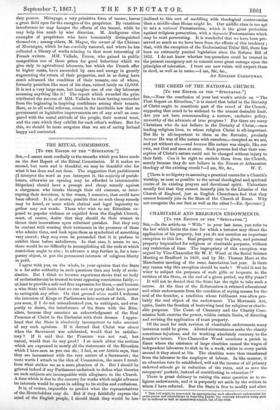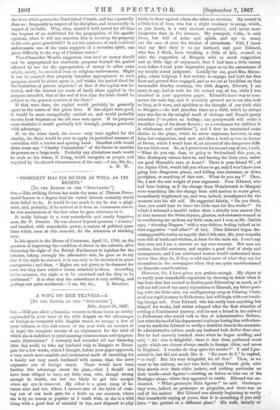CHARITABLE AND RELIGIOUS ENDOWMENTS. [To THE EDITOR OF THE "SPECTATOR."]
SIR,—In the article on " Wills " in your last issue, you refer to the law which limits the time for which a testator may direct the application of his property, but you do not mention an important exception to this law. Real property may be given, and personal property bequeathed for religious or charitable purposes, without any restriction of time. The impropriety of this exception was argued by Vice-Chancellor Sir W. P. Wood at the Social Science Meeting at Bradford in 1859, and by Mr. Thomas Hare at the Manchester meeting of the same Association last year. Is there any reason why this exception should be made ? Would it not be wiser to subject the purposes of such gifts or bequests to the revision of the State, at the end of a given period, say fifty years?
It will not be denied that the State has the right to take such a course. At the time of the Reformation it released educational and other endowments from the condition of saying masses for the soul of the founder, a condition whose fulfilment was often pro- bably the real object of the endowment. The Mortmain Act, again, limits the freedom of bestowing land for religious or charit- able purposes. The Court of Chancery and the Charity Com- mission both exercise the power, within certain limits, of directing and revising the application of trust property.
Of the need for such revision of charitable endowments many instances could be given. Altered circumstances make the charity sometimes injurious, and its working absolutely contrary to the founder's intent. Vice-Chancellor Wood mentions a parish in Essex where the existence of large charities caused the wages of independent labourers to sink to 8s. a week, whilst in every parish around it they stood at 10s. The charities were thus transferred from the labourer to the employer of labour. In like manner, if an education rate be established, will not the income of all primary endowed schools go in reduction of the rates, and so save the ratepayers' pockets, instead of contributing to education ?* There is great delicacy in raising the same question as to re- ligious endowments, and it is purposely set aside by the writers to whom I have referred. But the State is free to modify and alter
• This evil might be prevented by appropriating such educational endowments for extra prizes and scholarships to deserving pupils, the ordinary education being paid for iu endowed as well as unendowed schools, out of the rates.
the laws which govern the Established Church, and has repeatedly done so ; frequently in respect of its discipline, and occasionally in regard of its faith. Why, then, should it hold sacred for all time the bequest of an individual for the propagation of his specific opinions, when it will not sanction him in securing his property to his own great grandchild? Is not the existence of such restricted endowments one of the main supports of a sectarian spirit, one great difficulty in the way of Christian union ?
Vice-Chancellor Wood's suggestion that land or money should not be appropriated for charitable purposes beyond the period allowed by law for the appropriation of money iu other cases might, surely, be extended even to religious endowments. Might it not be enacted that property hereafter appropriated to such purposes should be either spent in full within the period fixed for the limitation of private bequests? or that if the capital was in- vested, and the interest (or rents of land) alone applied to the purpose intended, that at the end of that time the trust should be subject to the general revision of the State?
If that were done, the capital would probably be generally spent in the course of this given time. If this object were good, it would be more energetically carried on, and would probably receive fresh bequests as the old ones were spent. If its purposes were doubtful it would gradually fall through, perhaps generally with advantage.
If, on the other hand, the income only were applied for the charity, the State would be sure to apply its periodical measure of correction with a tender and sparing hand. Manifest evils would alone rouse any " Charity Commission " of the future to exercise its powers on a large scale. Probably any alterations made would be such as the donor, if living, would recognize as proper, and required by the altered circumstances of the case.—I am, Sir, &c., A. W. W.































 Previous page
Previous page